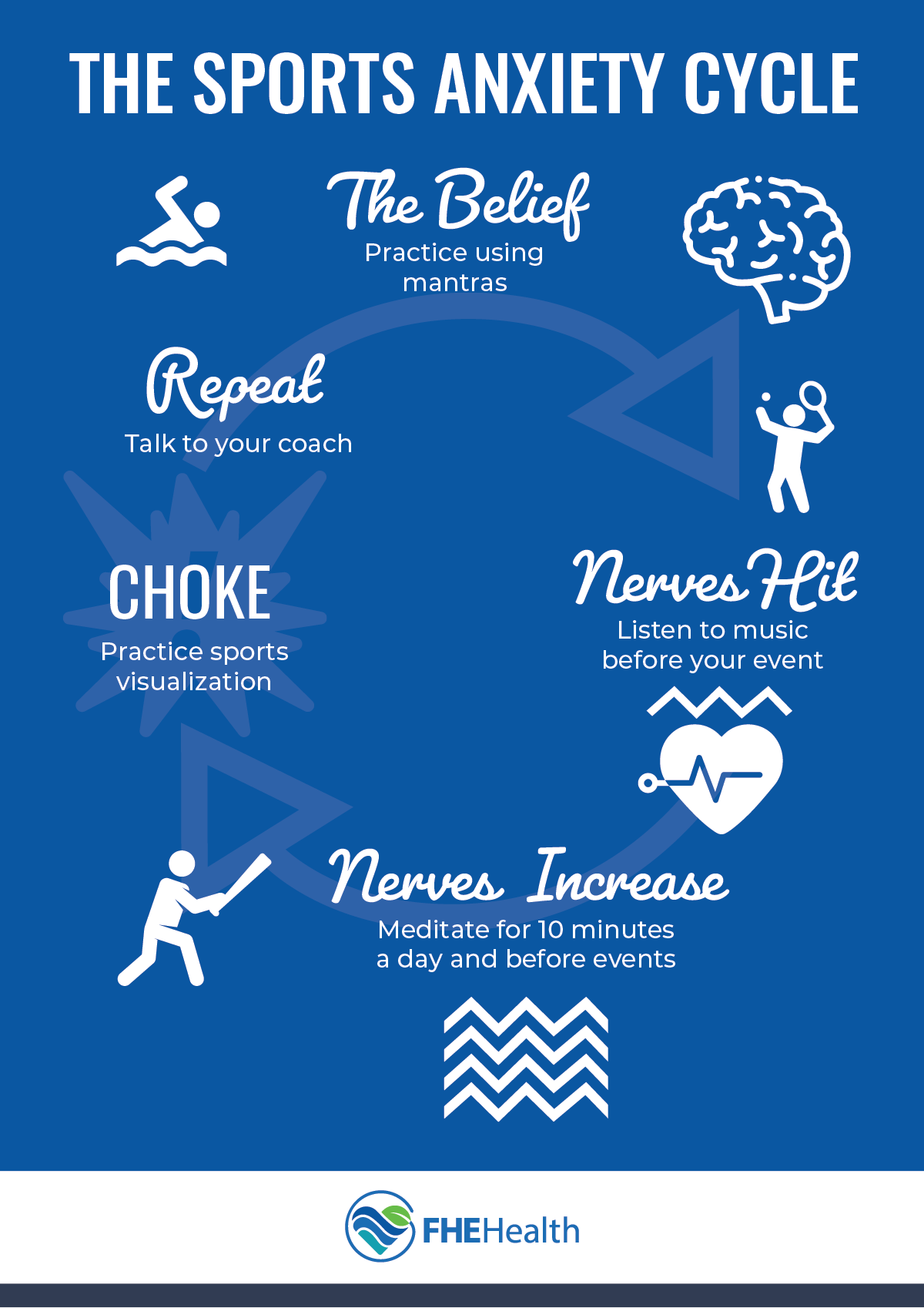
Performance anxiety is a common experience among athletes of all ages. Prior to competing, athletes often experience a surge of adrenaline. While some associate this surge with feelings of anticipation and excitement, others connect it with feelings of stress, worry, and anxiety. For those who feel anxious, negative thoughts can become disruptive and negatively impact performance. The body becomes tense, and movements and plays the athlete has successfully completed dozens of times suddenly feel impossible.
While every athlete’s experience with performance anxiety may be unique, there are some common symptoms. These may include:
- Stomach upset
- Feeling jittery
- Feelings of uncertainty
- Lack of confidence
- Sweating hands
- Increased breathing rate
- Tense muscles
- Increased heart rate
- Trembling
- Muscles weakness
- Feeling of panic
In more extreme cases, performance anxiety can trigger a panic attack. This may come with intense feelings of fear, chest pain, breathing difficulties and dizziness.
A certain amount of concern about performance isn’t a bad thing; in fact, it can motivate the athlete to take their training seriously and do their best when competing. However, when emotions run too high, it can be counterproductive, and negative self-talk can become a self-fulfilling prophecy when the athlete loses their confidence in their knowledge and training. Recognizing the thoughts and feelings behind performance anxiety can help athletes tackle it more effectively.

Overcoming Performance Anxiety
The good news is that performance anxiety is a problem that has a solution. By training the brain to perceive this type of stress differently, most athletes are able to overcome excessive pre-competition stress and channel it to improve their performance rather than impair it.
Reframing Negative Thoughts
Anxiety and anticipation are virtually indistinguishable from one another; the difference is in how the individual perceives what they’re feeling. For many athletes, simply reframing negative thoughts is enough to help them overcome the anxiety they feel before competing.
The first step to reframing negative thoughts is to recognize the thoughts that are distorted or don’t reflect reality. For example, for some people, negative thoughts may include downplaying or discrediting positive circumstances or potentially positive outcomes in favor of assuming the worst-case scenario. Other people may engage in negative self-talk or use “should” statements (“I should have practiced more/went to bed earlier/eaten differently.”)
Next, athletes can tackle negative thoughts by identifying their negative biases, or the negative assumptions they make about an outcome. When they’re feeling stressed before a competition, many discover that they assume the worst outcomes or the worst about themselves or their teammates. Negative thinking can become a habit that many people don’t even realize they’re engaging in, but changing internal dialogue can go a long way in preventing performance anxiety.
Thirdly, athletes can address negative thoughts by challenging them. Using “yes, but” phrases are an easy way to practice this. For example, “Yes, it’s true that this team beat our team last time, but we’ve improved significantly since then.”
Once an athlete learns to identify and challenge negative thoughts rather than automatically accepting them, they can reframe them and replace them with more objective, positive thoughts. This may involve using fewer negative words and looking at potentially stressful competitions as opportunities rather than threats. Using positive self-talk to counter negative thoughts can boost the athlete’s confidence in their ability.
Preparing Well
When most people think of preparing for competitions, they immediately imagine the physical training and conditioning that goes into being ready to compete. While physical training is certainly necessary and there are no shortcuts to achieving good form, mental preparation is equally critical for success. As U.S. Marine Corps General James Mattis famously said, “The most important six inches on the battlefield is between your ears.” This also holds true in sports, which require constant on-the-spot strategic thinking and problem-solving skills.
Visualization is a popular training technique that involves mentally rehearsing an upcoming competition. While most people do this naturally whether they realize it or not, visualization as a practice takes a mindful, positive approach that can enhance an athlete’s performance. It can improve the quality of an athlete’s movements, help them refine their strategies and gameplay, improve their concentration, and build their confidence. Because it stimulates the same region of the brain as the actual action, it can train the brain to succeed.
Many athletes also use breathing exercises to help them prepare to compete. Anxiety can cause increased heart rates, shortness of breath, and tense muscles, all of which can inhibit the body’s ability to move effectively, efficiently, and safely. By practicing breathing techniques, athletes can calm their minds, relax their muscles, and regain control of their bodies.
Most onlookers are excited about the competition itself, but few understand the level of preparation that goes into that relatively short performance. Adequate preparation requires both physical and mental training and conditioning and can help athletes tackle performance anxiety in sports.
Setting Realistic Goals
Oftentimes, sports performance anxiety comes when the individual puts too much pressure on themselves to succeed. While it makes sense to be concerned about performance—it would be hard to be a good athlete if you don’t care about the outcome of a competition—focusing solely on results and being afraid of not performing up to expectations can be counterproductive.
Instead of setting overly ambitious goals that may not be attainable, athletes can alleviate sports performance anxiety by setting measurable, realistic goals that reflect their abilities and the scope of their control. For example, having a goal of winning a match may not be realistic. However, making it a goal to get adequate sleep and nutrition before a competition, to be on time for practices, and to focus on teamwork are all measurable and within the individual’s ability to achieve. As time goes on, the athlete may continue to amend their goals to be more challenging.
Overly ambitious goals can feel impossible to achieve, creating a cycle of doubt, negative thinking, and discouragement. However, by setting reasonable goals that are within the individual’s control and then breaking those goals down into actionable steps, the athlete has a simple way to measure their performance and track their progress. This can build their confidence and help them feel ready to take on challenging competitions.
While anxiety can have a significant impact on how an athlete performs physically, its root cause is mental. No amount of training and conditioning can override this type of anxiety, but athletes can deal with it by tackling its root cause. Reframing negative thoughts, taking the time to mentally prepare for a competition, and setting achievable goals can help athletes achieve peak performance.






